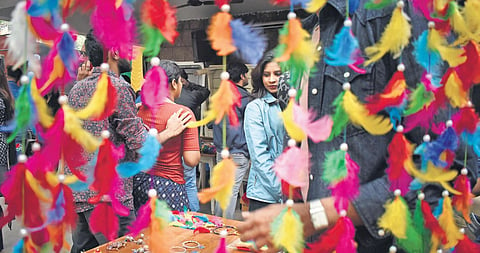

HYDERABAD: As part of Queer Azadi Carnival 2020, a discussion titled, ‘Impact of CAA, NPR and NRC on Queer and Transgender Persons and Allies’ held at Lamakaan saw transgender activists, Dalit feminists and members of the queer community come together on one platform. Vyjayanti Vasanta Mogli, a transwoman and RTI activist, who moderated the session, said: “We wanted to bring people from various backgrounds to talk about the draconian Citizenship Amendment Act.”
Rachana Mudraboyina, founder of Transvision, said: “After the NRC exercise in Assam, 2,000 transgender persons have been declared non-citizens of the country. But the fact remains that we were never considered citizens, and the community has been systematically criminalised over the years. Earlier, there was a system in which we had to record our movements with the local police station. Even now, beggars and sex workers from the transgender community have to deal with police every day. However, right now, the state is trying to divide us on the basis of our political ideologies. This was evident in the recent queer parade in Mumbai where 51 persons were charged with sedition. We have been living as one for years, and we need to fight NRC-CAA as one.” Dr Sowjanya Tamalapakula, professor at Tata Institute of Social Sciences, said: “We have to accept that caste and class are part of the queer community too. These identities are inter-sectional and not mutually exclusive. We can learn from each other.”
Sultana Yasmin, from Shaheen Women’s Resource and Welfare Association, said, “Even after the Babri Masjid verdict, I believe in the Supreme Court. While NRC-CAA has created so much fear among people, the government is concerned only about Pakistan and Gau Rakshaks. I appeal to the state not to discriminate against me because am a Muslim.”
Rubina, who works with marginalised communities, said that though she never covered her head all her life, she picked up the hijab this January to assert her identity in the fight against NRC-CAA. “Women in slums tell me that they are being charged Rs 5,000 instead of the usual Rs 1,200 for getting documents. People are not only scared, they are being fleeced too,” she added.
Dr Suneetha Achyutha, from Anveshi Research Centre for Women Studies, however, sees a silver lining in the protests. “We were mum during demonetisation or Babri Masjid verdict, but I am glad people are there on the streets now. The silence has been broken. This country has been built on the back of protests. “
Professor Sujatha Surepally from Satavahana University added: “If the Constitution is shaken, everyone will be affected. It will not remain a Dalit, Muslim or women’s agitation. We have to break free from these binaries.”
The event featured many voices that made it amply clear that they are united in fighting the divisive forces
— Kakoli Mukherjee
kakoli_mukherjee@newindianexpress.com
@KakoliMukherje2